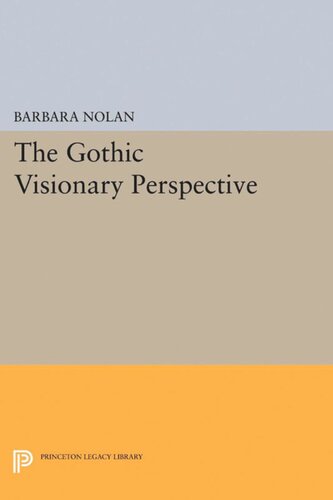

Most ebook files are in PDF format, so you can easily read them using various software such as Foxit Reader or directly on the Google Chrome browser.
Some ebook files are released by publishers in other formats such as .awz, .mobi, .epub, .fb2, etc. You may need to install specific software to read these formats on mobile/PC, such as Calibre.
Please read the tutorial at this link: https://ebookbell.com/faq
We offer FREE conversion to the popular formats you request; however, this may take some time. Therefore, right after payment, please email us, and we will try to provide the service as quickly as possible.
For some exceptional file formats or broken links (if any), please refrain from opening any disputes. Instead, email us first, and we will try to assist within a maximum of 6 hours.
EbookBell Team

4.3
48 reviewsBarbara Nolan contends that attitudes toward the meaning of history, prophecy, and vision developed by religious writers of the twelfth and early thirteenth centuries fundamentally affected the shape of literary narrative and religious art for two centuries. In these essays, she explores some of the most important moments in this Gothic visionary perspective.
The author first follows the history of Apocalypse commentaries from Bede to Alexander of Bremen, focusing particularly on twelfth-century interpretation of Revelation as a spiritual guidebook for the contemporary Christian. She shows that innovative interpretations in these texts have parallels in the cathedral art of St.-Denis and Chartres, the illuminations for later medieval illustrated Apocalypses, and the invention of new "anagogical" literary modes.
Professor Nolan's close study of the Vita Nuova indicates that in his earliest work Dante used a prophetic voice and a graded series of visions to shape his conventional love story into a book of revelation. Examination of the thirteenth-century spiritual quest reveals that French writers, transforming older monastic forms, gave new importance to the process of conversion by way of vision. Pearl and Piers Plowman participate in the tradition of the spiritual quest even as Piers marks a final moment in its history.
Originally published in 1977.
The Princeton Legacy Library uses the latest print-on-demand technology to again make available previously out-of-print books from the distinguished backlist of Princeton University Press. These editions preserve the original texts of these important books while presenting them in durable paperback and hardcover editions. The goal of the Princeton Legacy Library is to vastly increase access to the rich scholarly heritage found in the thousands of books published by Princeton University Press since its founding in 1905.